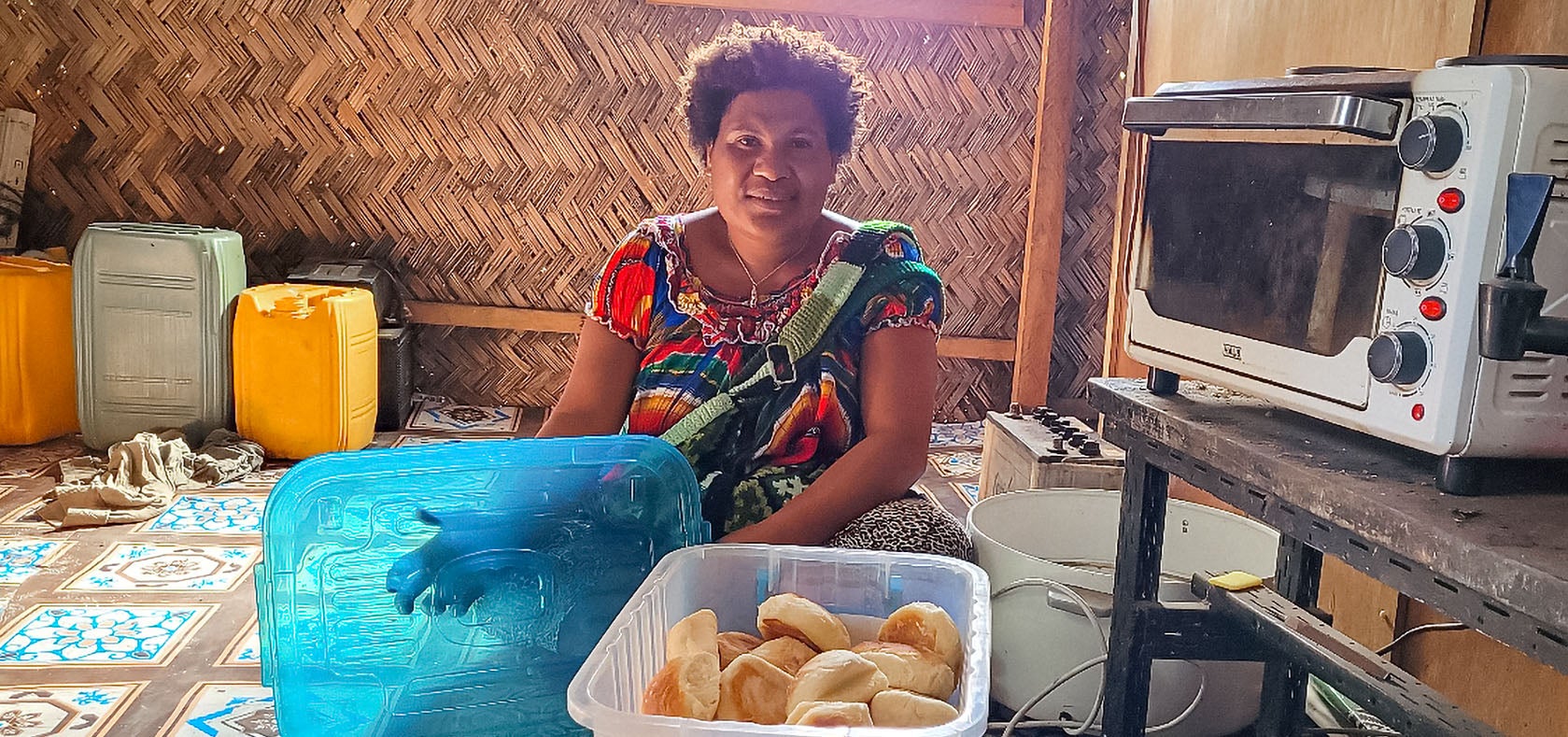From betel to buns: New baking skills boost market vendors’ income during pandemic
Date:
Author: Aidah Nanyonjo

Teiyo Amos was struggling to make ends meet from her income as a market vendor after the COVID-19 pandemic struck. Her husband was back from Australia where he had been working in mining, leaving her as the family breadwinner. But her profits from selling betel nut and potatoes in the main market of Goroka, Papua New Guinea, were not sustaining her family.
But she has seen a reversal of fortune after receiving support from UN Women. Equipped with her new baking training and a small electric oven, Teiyo has diversified to baking buns and doughnuts for sale in schools and at the market. “My family’s income has improved. Thank you, UN Women for the livelihood training.”
The initiative is part of UN Women’s Markets Economic Recovery and Inclusion (MERI) programme to empower women market vendors to cope with the impacts of the COVID-19 pandemic in 12 major markets across Papua New Guinea. UN Women with support from the Government of Australia trained women market vendors in advanced tailoring, baking, financial literacy and food handling, to help them diversify their livelihoods and restore their income to pre-pandemic levels. The baking skills included making buns, scones, muffins, and cupcakes. At least 43 percent of women market vendors reported their incomes to have returned to pre-pandemic levels thanks to the programme.
In Mt Hagen, Rose Timothy owned a small shop close to the market, which used to sell groceries and bakery products such as buns, scones, and doughnuts. Her wish was to bake her own products to increase profits. Her dream came true when she was selected for the baking and financial literacy training supported by UN Women. After the training, she quickly implemented the skills. Today, she bakes her own products using locally produced raw materials such as bananas. With the growing demand for her products, Rose decided to abandon selling groceries and concentrate on baking, which was giving her above-normal profits. For every 5 kilogrammes of flour used, Rose makes K30.00 profit (around USD 8.50).
In Kokopo, Lucy Karrek used part of her package from retiring as a school teacher to start a baking business. Baking had always been a passion of hers, and she had the equipment, but not the skills. On several occasions, she tried baking but the products were not good for the market. She abandoned bakery for poultry. When UN women called for the livelihood and financial literacy training, Lucy registered. She learnt how to bake baby bread, bans, cupcake, and doughnuts. When she applied her new skills, the buns were good and liked by the customers. Since then, she bakes on Tuesdays, Thursdays and Fridays, and has a steady customer base. She sells to locals in her village. Some of her customers buy for resale. She gets profits of about K80 a week. “I am grateful to UN Women for the training opportunity, as it helped me to revive my baking dream and at the same time earn a living,” she said.
Jean Gumasi is a vendor in Alotau main market, who used to sell fried cookies and agricultural products. But the profits could not sustain her family. She could not save money, and always wished to own a big profitable business. Things got worse when the government introduced restrictions to curb the spread of COVID-19. When UN Women introduced training on baking and financial literacy for Alotau market vendors, Jean saw it as an opportunity for her to expand her business and make good profits. She joined other women venders to train in baking buns, scones, muffins, and cupcakes. After the training, Jean realized that bakery products sell fast and have high profits. Her husband supported her by building an oven using cheap and locally assembled materials. Jean’s daily sales and income have increased and she plans to increase the quantity she produces to supply big shops.